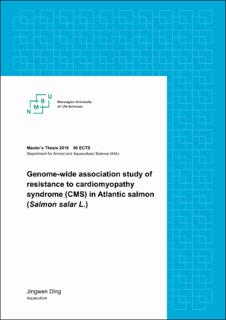| dc.contributor.advisor | Gjerde, Bjarne | |
| dc.contributor.advisor | Boison, Solomon Antwi | |
| dc.contributor.author | Ding, Jingwen | |
| dc.date.accessioned | 2020-04-14T07:36:41Z | |
| dc.date.available | 2020-04-14T07:36:41Z | |
| dc.date.issued | 2019 | |
| dc.identifier.uri | https://hdl.handle.net/11250/2650872 | |
| dc.description.abstract | Cardiomyopathy syndrome (CMS) is considered as a serious viral disease in Norwegian farmed Atlantic salmon. Outbreaks of the disease occur without any observable signs and CMS primarily affects adult salmon. In 2011, piscine myocarditis virus (PMCV) was detected as the causative agent of CMS and the attempts to develop effective vaccines have not been successful so far. In this study, we estimated genetic variation for resistance to CMS and performed genome-wide association study (GWAS) to uncover quantitative trait loci (QTL) for resistance to CMS in a Marine Harvest population. A total of 620 commercial Atlantic salmon from a population that were infected by CMS in a field outbreak were genotyped with a 57K single-nucleotide polymorphism (SNP) Affymetrix array and were used in this study. The heritability of resistance to CMS was moderate (h2 ~ 0.39). Two significant QTL regions were identified, one on chromosome 12 and other on chromosome 27 that explained ~12.4% and ~12.7% of the total additive genetic variance, respectively. Candidate genes, which were identified in the QTL region on chromosome 12, showed strong relationship with energy production in the cells (SLC25A26, MAPKAPK3), while some of them were related to immune responses (RAB7A) and the process of heart formation (ADAMTS9). Candidate genes in the region of the QTL on chromosome 27 included immune related genes (PRUNE, MLLT11) and genes (PVRL2L) that are expressed upon virus infection. The results of this study provide useful information for increasing CMS resistance in Atlantic salmon. | en_US |
| dc.description.abstract | Kardiomyopati syndrom (CMS) er en alvorlig virussykdom i norsk oppdrettslaks. Utbrudd av sykdommen oppstår uten noen observerbare tegn og CMS påvirker primært voksen laks. Siden 2011 er piscint myokarditt virus (PMCV) ansett som årsaken til CMS, men forsøk på å utvikle effektive vaksiner har så langt ikke vært vellykket. I denne studien estimerte vi genetisk variasjon for resistens mot CMS hos laks fra Marine Harvest og utførte en genom-vid assosiasjons studie (GWAS - genome-wide association study) for å påvise og lokalisere kromosom regioner med relative store effekt (QTL) på resistens mot CMS hos laks fra Marine Harvest.
Totalt 620 laks fra en populasjon infisert med CMS ble genotypet med en 57K enkeltnukleotid polymorfi (SNP - single-nucleotide polymorphism) Affymetrix matrise. Arvbarheten for resistens mot CMS var moderat (h2 ~ 0,39). To signifikante QTL-regioner ble identifisert, en på kromosom 12 og en på kromosom 27 og som forklarte henholdsvis ~ 12,4% og ~ 12,7% av den totale additiv genetiske variasjonen.
Kandidatgener i QTL-regionen på kromosom 12 er funnet å være sterkt koplet til energiproduksjonen i cellene (SLC25A26, MAPKAPK3), andre til immunrespons (RAB7A) og oppbygging av hjertet (ADAMTS9). Kandidatgener i QTL-regionen på kromosom 27 er immunrelaterte gener (PRUNE, MLLT11) og gener som styrer virus reaksjoner (PVRL2L). Resultatene av denne studien gir nyttig kunnskap for å kunne øke laksens resistens mot CMS. | en_US |
| dc.language.iso | eng | en_US |
| dc.publisher | Norwegian University of Life Sciences, Ås | en_US |
| dc.rights | Attribution-NonCommercial-NoDerivatives 4.0 Internasjonal | * |
| dc.rights.uri | http://creativecommons.org/licenses/by-nc-nd/4.0/deed.no | * |
| dc.subject | QTL analysis | en_US |
| dc.subject | Heritability | en_US |
| dc.title | Genome-wide association study of resistance to cardiomyopathy syndrome (CMS) in Atlantic salmon (Salmon salar L.) | en_US |
| dc.type | Master thesis | en_US |
| dc.description.localcode | M-AA | en_US |

